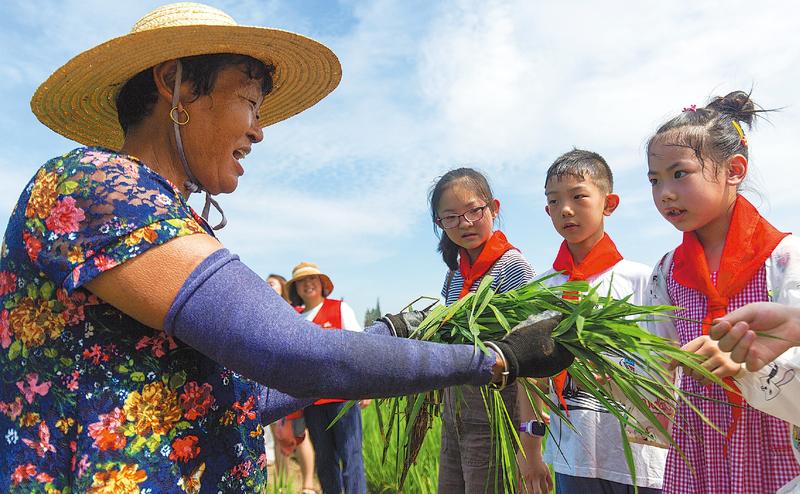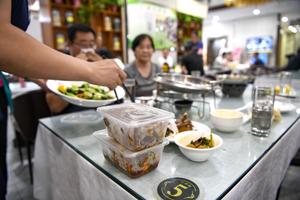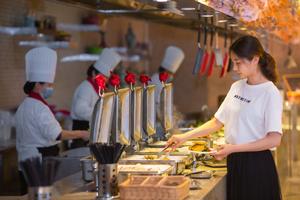Series of campaigns launched nationwide
 A farmer teaches primary school students in Rugao, Jiangsu province, how to grow rice. (XU HUI / FOR CHINA DAILY)
A farmer teaches primary school students in Rugao, Jiangsu province, how to grow rice. (XU HUI / FOR CHINA DAILY)
After a satisfying lunch, Qian Bingkun and his wife watched a waitress pack their leftover stir-fried tofu and dessert into takeout boxes as their daughter paid for the meal.
"You've upgraded the appearance of your to-go boxes, right?" Qian, 80, asked the waitress at the Yongmama restaurant in Lubei district, Tangshan, Hebei province, on Thursday.
In recent decades, Chinese people’s attitude toward food has changed significantly — from merely hoping to get adequate supplies, to pursuing a healthy diet. But at the same time, food waste has gradually become common in society
Li Zhou, economist and former director of the China Academy of Social Sciences’ Rural Development Institute
Busily packing the uneaten food into a microwaveable box bearing a design of traditional blue-and-white Chinese porcelain, the waitress replied, "Yes, it's to encourage customers to take leftovers after they've eaten."
Qian said: "Good! Very good! Too much waste should be avoided."
Dong Xiujie, the restaurant's manager, said a series of measures have been introduced to remind customers not to order too much food. The slogan "food is a gift from nature, let's not waste it!" adorns a wall at the eatery.
Some measures were first rolled out two years ago when the 22-table restaurant noticed that leftovers each day amounted to more than 250 kilograms.
"Some food had hardly been touched, because customers were used to ordering more than they could eat to show their generosity," she said, adding that the measures have succeeded, as the amount of daily leftovers has since halved.
Campaigns against food waste were launched nationwide after President Xi Jinping on Tuesday reiterated the need for greater awareness of the risks posed to the country's food security and called for resolute efforts to promote thrift and combat food waste.
Citing the words of a Tang Dynasty (618-907) poem-"Who knows that of our meal in the dish, every grain comes after hard toil?"-the president urged the nation to constantly be aware of huge food wastage despite consecutive years of bumper grain harvests. The impact of the COVID-19 pandemic had sounded alarm bells, he said.
Xi, also general secretary of the Communist Party of China, has made a number of remarks on safeguarding food security and halting food waste.
In 2013, he said, "Food waste in the catering sector is shocking and distressing, as a large number of people are still experiencing poor livelihoods … Food waste must be stopped, and the virtuous tradition of thrift should be promoted."
In 2018, during an inspection tour in Heilongjiang province, he said, "The rice bowl of the Chinese people, in any situation, must be firmly held in our own hands."
Responding to the president's call, restaurants, trade associations and local governments have come up with measures to reduce food waste.
 A waitress packages leftovers for customers at a restaurant in Yinchuan, Ningxia Hui autonomous region, Aug 16, 2020. (PHOTO / XINHUA)
A waitress packages leftovers for customers at a restaurant in Yinchuan, Ningxia Hui autonomous region, Aug 16, 2020. (PHOTO / XINHUA)
The China General Chamber of Commerce, the China Cuisine Association and the China Hotel Association jointly proposed that the catering industry should curb food waste and promote thrift.
In Hubei province, the Wuhan Catering Association suggested that diners adopt the "N-1 mode", meaning that if they eat together, they should order dishes as though there was one fewer person in the group.
In Shaanxi province, the Xi'an municipal commerce bureau called for local eateries to provide smaller dishes or to serve half portions to avoid waste.
In the Yaohai district of Hefei, Anhui province, local authorities used more than 500 volunteers to distribute leaflets about table etiquette, including taking away leftovers and using serving chopsticks to select food from shared dishes. The leaflets went to more than 2,300 eateries.
Jiang Zhuyue, who lives in the district, said, "When I saw people taking food from shared dishes with their own chopsticks, I was reluctant to take leftovers home to share with my family, due to concerns about hygiene."
However, she added that more eateries are now placing several pairs of serving chopsticks or spoons on tables, adding, "As a result, I'm now more willing to take the leftovers away."
At the Anhui Jinling Grand Hotel in Hefei's downtown Baohe district, diners who avoid food waste have been rewarded since April. If they take away their leftovers, customers receive either a 10 percent discount or a 50 yuan (US$7.19) coupon to use on their next visit.
Shen Qi, the hotel's catering manager, said, "In contrast to family gatherings, banquets are more prone to food waste, because hosts often wrongly think that extravagance demonstrates their generosity."
The Datang Fenghuangyuan Catering Entertainment Co in Lubei district of Tangshan, Hebei, which caters to weddings and parties, has put up notices reminding customers to avoid food waste.
A banner hung at the door to a wedding hall states, "Waste is shameful, thrift is to be applauded". On tables seating 10 diners, a plate is laid bearing the words "no leftovers", while a large electronic screen, usually used to show newlyweds' photos, displays the slogan: "We are in action! Say no to waste food!"
Zheng Lina, the company's general manager, said: "These are all very necessary measures because weddings and parties are typical examples of serious food waste. To avoid this, we have also changed our serving sizes."
Previously, a dish of shrimps usually comprised as many of the crustaceans as a plate could hold, but now only 10 to 12 shrimps are served to a table of 10 diners.
In Shanghai, the Suntime Century restaurant in the Kempinski Hotel introduced an individual set menu in May.
Renepol Bouldoires, the hotel's food and beverage director, said the culinary team ensured the menu featured a variety of dishes with sufficient portions for each diner. The menu has been particularly popular for business meals, he added.
At Acqua, its Italian restaurant, the hotel has introduced a fine of 100 yuan for every 50 grams of food wasted at its "all-you-can-eat" Saturday brunch. "We promote food awareness, and to avoid waste we advise guests not to over-order," Bouldoires said.
The Shanghai Yuyuan Tourist Mart Co said the long-established restaurants it operates have always encouraged customers to order sensibly and take their leftovers home. The eateries also specify the weight of food in each dish on their menus.
In recent years, chibo, or livestreaming people eating food, which initially became popular in Japan and South Korea, has been taken up by increasing numbers of online broadcasters in China.
Some shows feature excessive quantities of food being eaten in a short time, while others focus on diners tucking into raw seafood or extremely spicy dishes.
 Food saving is encouraged at a restaurant in Hai'an, Jiangsu province. (ZHAI HUIYONG / FOR CHINA DAILY)
Food saving is encouraged at a restaurant in Hai'an, Jiangsu province. (ZHAI HUIYONG / FOR CHINA DAILY)
Li Yijun, a food video producer on Douyin, the short-video sharing platform, said he disagrees with such practices.
"Every time I make a food video at a restaurant, I'm frequently offered a table full of dishes, but I always pack up the leftovers if I cannot eat them all," said Li, who started posting food videos in January and now has nearly 50,000 followers.
"I cultivated this habit in childhood, and I feel it would be a great waste if I just throw the food away after shooting," he added.
On Wednesday, China Central Television criticized food waste, citing some livestream broadcasts as a bad example. The post on Sina Weibo was quickly "liked" by tens of thousands of people.
Many video-sharing platforms responded to the criticism by suspending accounts that publish footage of food being squandered.
Searches for "chibo" on the Bilibili video-sharing website produce a notice at the top of the results reminding people to cherish food and eat sensibly.
On Thursday, the short-video app Kuaishou said it would deal seriously with videos showing excessive eating and drinking, while those that feature fake eating and vomiting would be deleted and the accounts closed.
New laws on way
Meanwhile, the national legislature is planning new laws to prevent food waste.
In an interview with the National Supervisory Commission website on Thursday, Zhang Guilong, senior counsel for the Legislative Affairs Committee of the National People's Congress, said a task force had been formed to research new legislation on food waste.
"Rules and regulations on preventing food waste are scattered throughout existing laws, and lack a system and focus," Zhang said. "We will make new laws that give clear instructions on avoiding waste in every part of food production, purchasing, storage, transportation, processing and consumption."
Many people have voiced support for stricter rules against squandering food.
Zhang Siying, 56, a publishing house editor in Beijing, said she becomes angry every time she sees food left uneaten in canteens and restaurants.
"My generation went through tough times when there were food supply quotas and we saved our precious 'meat tickets' for holidays such as the Lunar New Year or when hosting special guests," she said.
"Sometimes, because of shortages, we couldn't get food even if we had tickets. Back then, there were no leftovers after meals. Wasting food was simply out of the question."
 A customer serves herself at a hotel buffet in Taizhou, Jiangsu. (TANG DEHONG / FOR CHINA DAILY)
A customer serves herself at a hotel buffet in Taizhou, Jiangsu. (TANG DEHONG / FOR CHINA DAILY)
Zhang remembers one Spring Festival when she had a ticket to buy candy and visited all the shops near her home in Chengdu, Sichuan province, only to find that confectionery had sold out.
"I was only about 10 at the time, and I felt so sad and disappointed. My father, who experienced starvation, always taught us to cherish all our food, but young people nowadays don't have such memories, so we should educate them about just how precious food is," she said.
Chen Xiaojing, a former kindergarten teacher in Shanghai, said she hates wasting food, and always praises children when they clear their plates at lunch.
"It's only a small encouragement, but it helps cultivate a good habit. Saving food is the responsibility of every citizen," she said.
Bumper harvest
According to the National Bureau of Statistics, China's food output last year reached a record 660 million metric tons, a rise of 20 percent from 2010.
However, a report published by the UN Food and Agriculture Organization in April said the coronavirus pandemic has disrupted the food supply chain.
A preliminary assessment from the FAO suggested that the pandemic could result in an additional 83 million to 132 million people being undernourished worldwide this year.
On Aug 8, Han Changfu, minister of agriculture and rural affairs, said in a People's Daily article that some countries had limited their food exports, but with international agricultural markets facing increased volatility, China had been able to maintain ample food supplies and stable prices.
"Safeguarding national food security is a perennial task, and we should not neglect it or be complacent," Han wrote.
Many factors are involved in ensuring security of the food supply chain, from production and distribution, to consumption management and storage.
Li Zhou, an economist and former director of the China Academy of Social Sciences' Rural Development Institute, said food waste in the catering sector may not lead to famine, but will put pressure on the environment.
"In recent decades, Chinese people's attitude toward food has changed significantly-from merely hoping to get adequate supplies, to pursuing a healthy diet. But at the same time, food waste has gradually become common in society," he said.
In 2018, an investigation by the Institute of Geographic and National Resources Research and the World Wide Fund for Nature estimated that Chinese consumers in four large cities wasted 17 million to 18 million tons of food in 2015-enough to feed 30 million to 50 million people for a year.
The investigation, which surveyed 366 restaurants in Beijing, Shanghai, Chengdu and Lhasa, capital of Tibet autonomous region, found each person wasted 93 grams of food at a meal, or 11.7 percent of that served. At large banquets, more than one-third of the food was thrown away.
Eating all the food placed on a table is just the first step to putting an end to squandering, as a considerable amount is wasted in other areas of the supply chain.
Li said the government should educate people that refined processing of commodities such as rice and wheat will not necessarily increase nutritional value, but will use more natural resources and create additional waste.
He also hit out at the commercial hype surrounding imported food and fine dining.
"To reduce energy use and resource costs per unit of food in production and transportation, we should promote the idea of eating locally instead of eating globally," he said.
Gu Yuhan contributed to this story.


